Key takeaways:
- Authenticity is crucial for connecting with readers and enhancing emotional resonance in writing.
- Experimenting with various writing styles fosters growth and helps uncover one’s unique voice.
- Embracing feedback and maintaining a regular writing practice significantly contribute to the development of a writer’s identity.
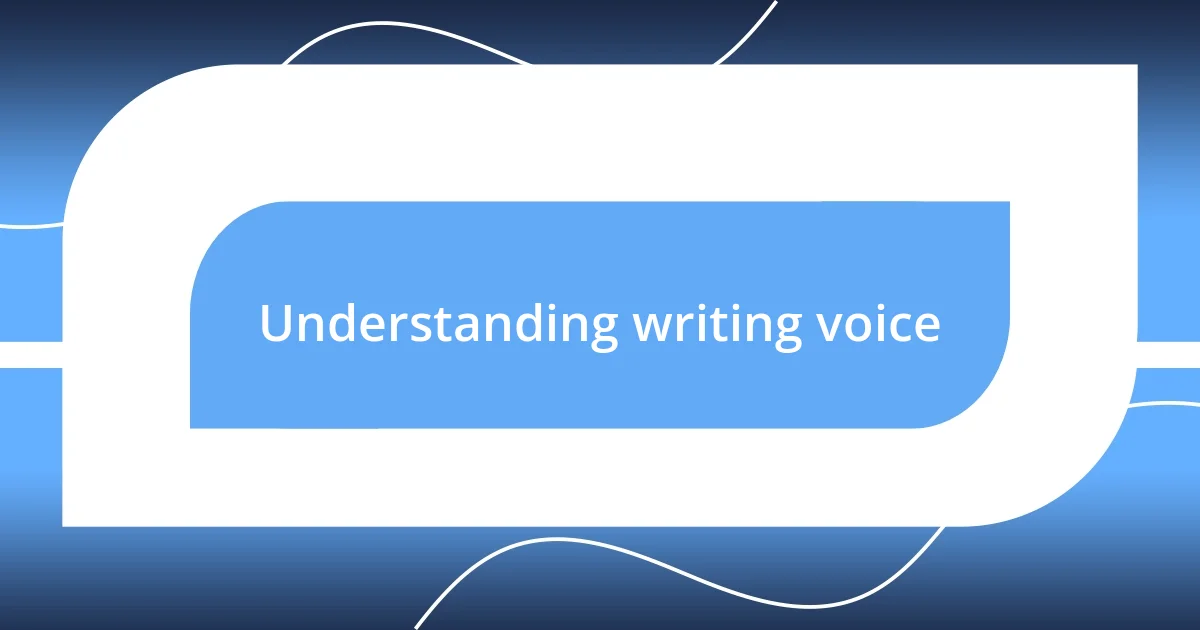
Understanding writing voice
Understanding your writing voice is like discovering a part of yourself that’s been waiting to be expressed. I remember when I first started writing; I mimicked styles I admired, believing that would make me a better writer. But each attempt left me feeling hollow, as if I were wearing someone else’s skin.
As I delved deeper into my own thoughts and experiences, I realized that my unique voice emerged when I wrote from my authentic self. Have you ever noticed how much more engaging it is when someone tells a story that’s genuinely theirs? This connection can transform your writing from mundane to captivating, inviting readers to enter your world.
It’s intriguing to consider how our life experiences shape our voice. I recall a time when I poured my heart into writing about a personal challenge, and the feedback I received was overwhelming. People resonated with my vulnerability, proving that authenticity can create bridges between the writer and the reader, fostering an enriching dialogue that lingers long after the words are read.
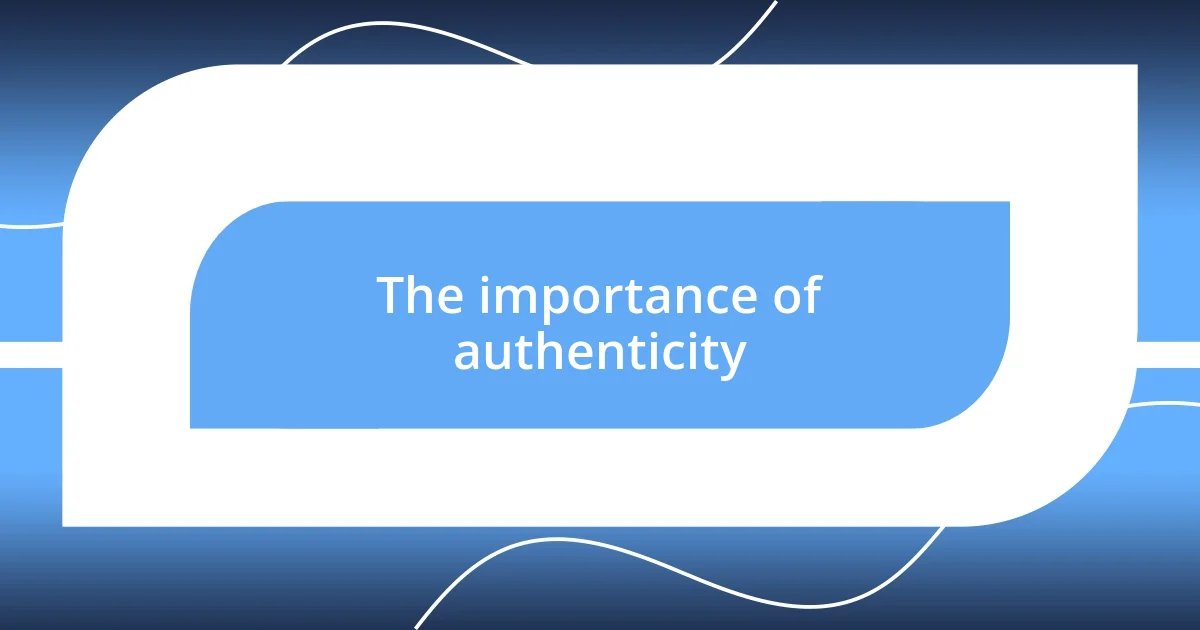
The importance of authenticity
Authenticity in writing is vital because it creates a genuine connection with readers. When I finally let go of imitating others, I found that my stories resonated on a different level. I remember sharing a humorous yet cringe-worthy moment from my teenage years, and the laughter it triggered was infectious. Readers could see themselves in my awkwardness, making the piece relatable.
Here are some reasons why authenticity matters:
- Genuine Connection: Readers gravitate towards honesty; it fosters trust and empathy.
- Captivating Engagement: Unique voices draw attention, making them more likely to return for more.
- Emotional Resonance: Authentic stories can evoke powerful emotions, leaving a lasting impression.
- Personal Growth: Writing honestly about one’s experiences promotes self-discovery and healing.
- Readers’ Loyalty: When readers relate to your authenticity, they become loyal fans, eager for your perspective.
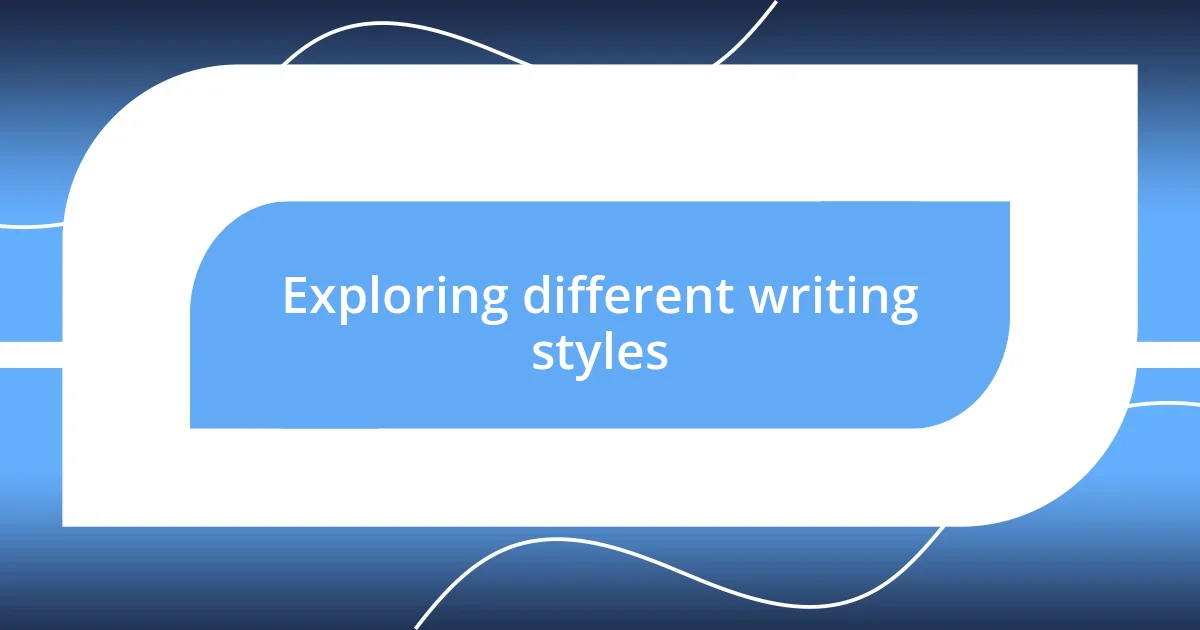
Exploring different writing styles
Exploring various writing styles is a significant step on the journey to finding my unique voice. In my early days as a writer, I dabbled in different styles—from the structured elegance of formal writing to the stream-of-consciousness approach that felt liberating yet chaotic. I often felt like a traveler experimenting with various paths, and some styles resonated deeper than others, guiding me closer to my authentic self.
I’ve found that each writing style has its distinct flavor, shaping how ideas are conveyed. For example, persuasive writing taught me the importance of clarity and conviction, which helped me gain confidence in my arguments. Meanwhile, creative writing allowed me to paint with words, invoking emotion and imagery that connected with readers in a profound way. Each exploration revealed not only techniques but also the essence of my voice within those frameworks.
Ultimately, experimenting with different writing styles has been a reflection of my own growth. I remember a particularly transformative moment when I first tried lyrical writing—a style imbued with rhythm and melody. As I wove my emotions into carefully chosen words, I felt an exhilarating freedom, almost like dancing on the page. This experience made me realize that my voice was not just about the words I chose, but about the passion and intent behind them.
| Writing Style | Key Characteristics |
|---|---|
| Formal | Structured, objective, refined language; appropriate for academic or professional contexts. |
| Persuasive | Clear arguments, logical reasoning, aims to convince readers; often found in opinion pieces. |
| Creative | Imaginative, expressive; focuses on storytelling, character development, and emotional connection. |
| Lyrical | Rhythmic and musical language; evokes emotion through sound and imagery, creating a melodic flow. |
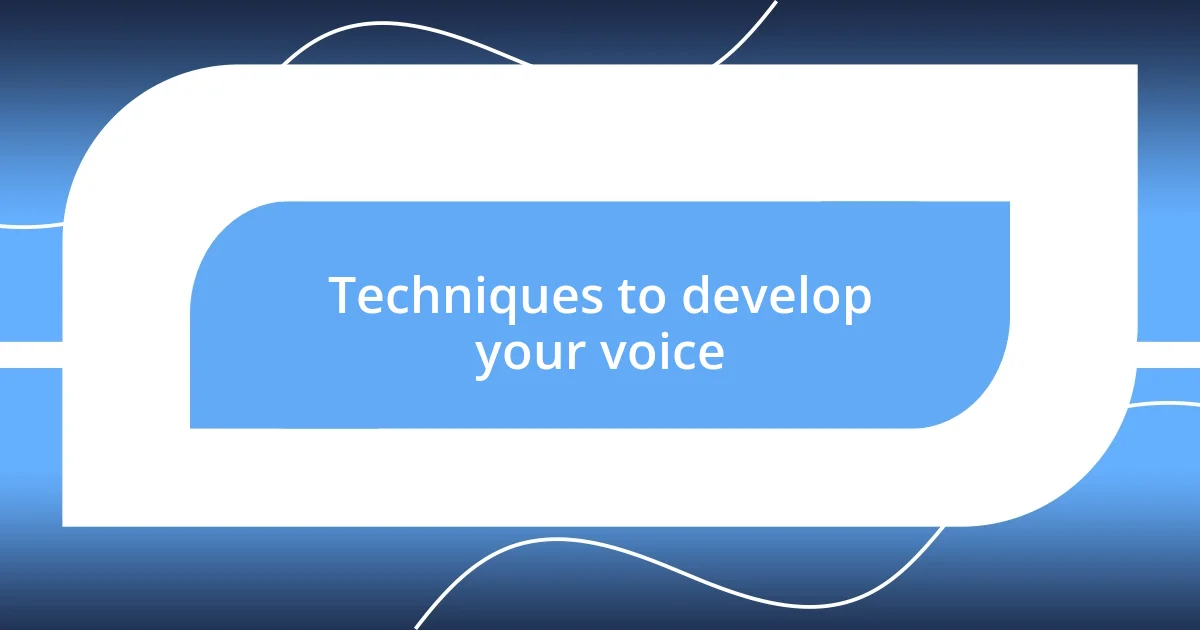
Techniques to develop your voice
Finding your unique writing voice can be a deeply personal journey, and one effective technique is to engage in free writing. I remember setting aside a quiet hour one afternoon and simply letting my thoughts flow onto the page without worrying about structure or grammar. It felt liberating to release my inner critic, and to my surprise, some of the ideas that emerged were pure gems. This practice not only helps in uncovering raw thoughts but also reveals the nuances of voice that often get buried under the weight of expectation.
Reading widely is another vital technique that I’ve found invaluable in developing my voice. I often immerse myself in books across various genres—fiction, poetry, memoirs, even graphic novels. Each unique author brings their distinct voice to life, and I can’t help but ask myself, “What resonates with me?” I recall reading a particularly unique memoir that interwove humor with serious themes, and it dawned on me that I could incorporate that blend into my own writing. Discovering different voices can inspire us to refine our personal style and discover what truly speaks to us.
Finally, seeking feedback from trusted peers has been an essential part of my growth. I actively participate in writing groups where we share our work and discuss our personal journeys. I remember a time when a fellow writer pointed out the emotional depth in my piece that I hadn’t even recognized. Their insights illuminated aspects of my voice that I was yet to fully embrace. Constructive feedback helps us see our writing from another perspective, opening doors for further exploration of style and authenticity. How about you? Have you ever had a moment of revelation when someone highlighted something you overlooked in your writing? It’s moments like these that can push us further along the path of discovering our unique voice.
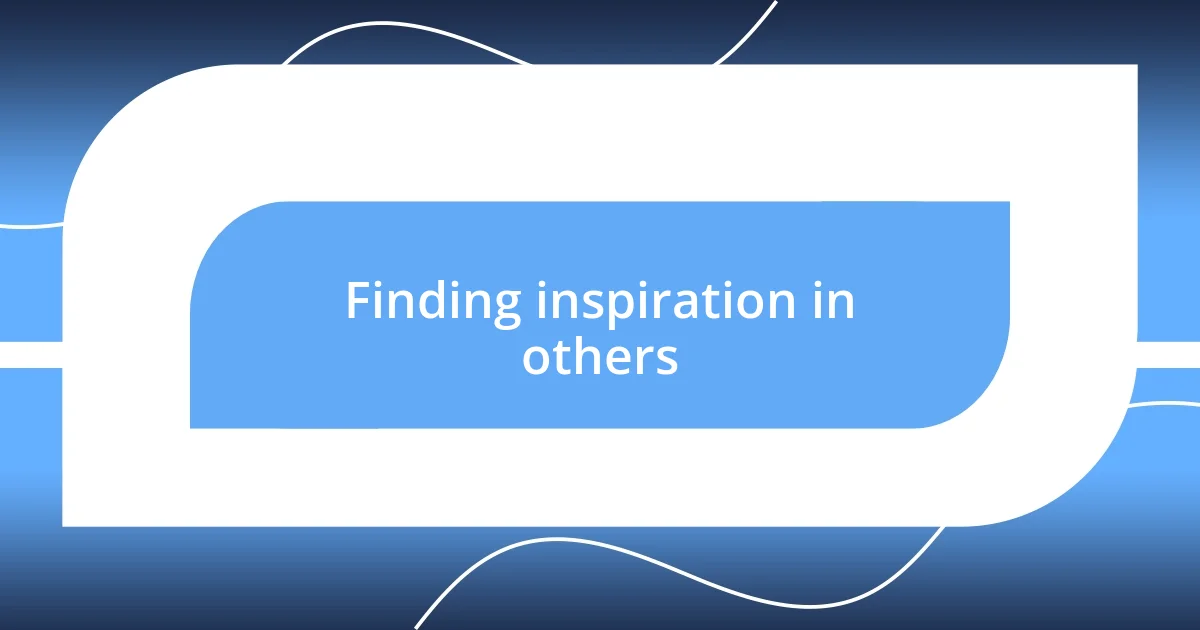
Finding inspiration in others
I’ve found that inspiration can come from the most unexpected sources. For instance, attending an open mic night a few years ago opened my eyes to the power of spoken word. The energy in the room was palpable, and listening to each performer share their stories sparked a flame of creativity within me. I thought, “How can I infuse this passion and authenticity into my own writing?” These moments of connection with others fuel not just my writing but my entire approach to storytelling.
Another memorable experience was joining a local writers’ workshop. Hearing different voices and perspectives pushed me to reflect on my own. I remember one participant who had a knack for weaving humor into their essays, tackling serious subjects effortlessly. It made me ponder, “What if I approached my heavier topics with a pinch of levity?” Finding that balance in my writing was a turning point—one that highlighted how other writers can help refine our voice just by being true to themselves.
Sometimes, I even find inspiration from authors I admire in unexpected places. When I stumbled upon a blog post by a favorite writer discussing their struggles, it resonated deeply with me. It reminded me that vulnerability can be a powerful tool in writing. I thought, “If they can embrace their imperfections, so can I.” That realization helped me understand that my voice doesn’t need to be perfect; it just needs to be real. And isn’t that what we all seek—a genuine connection through words?
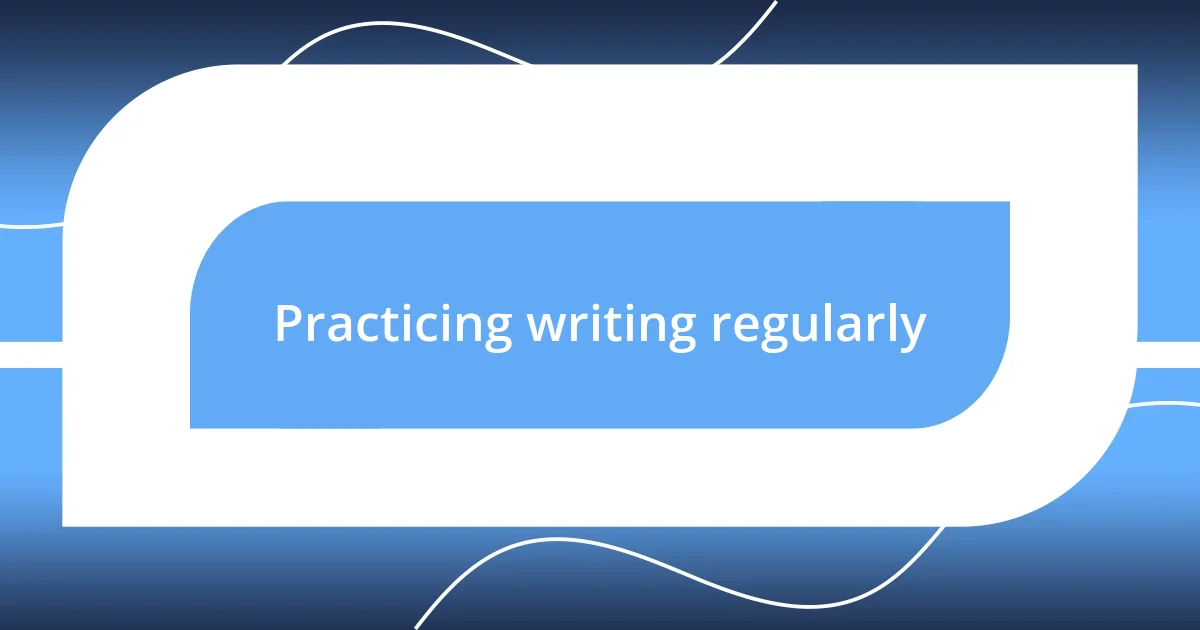
Practicing writing regularly
Embracing a regular writing practice has been a game changer for me. At first, I struggled to find the time amidst a busy schedule, but when I committed to writing every day, even if just for 10 minutes, I noticed a profound shift. I often think, “What if those short bursts of creativity are where my true voice lies?” Those tiny sessions freed me from expectations and allowed my thoughts to reflect a more authentic side of me.
I remember one evening, I set a timer and began jotting down my thoughts while sipping a cup of chamomile tea. The gentle rhythm of the pen on the paper became almost meditative. As ideas poured out, I started to see patterns in my style and tone. It was like peeling back layers to uncover a voice that had been quietly waiting to emerge. This practice not only boosts creativity, but it also fosters self-discovery; each session is a small step toward my writing identity.
Moreover, writing regularly teaches resilience. I’ve faced my share of frustration when the words didn’t flow or when I doubted my skills. But pushing through those moments has solidified my belief that perseverance is key. Every writer battles self-doubt at some point, and developing a steady routine has become my antidote. Have you ever felt that spark when you finally get into the groove of writing? That euphoria is worth all the struggle and reaffirms the notion that regular practice is a foundation upon which our unique voices can thrive.
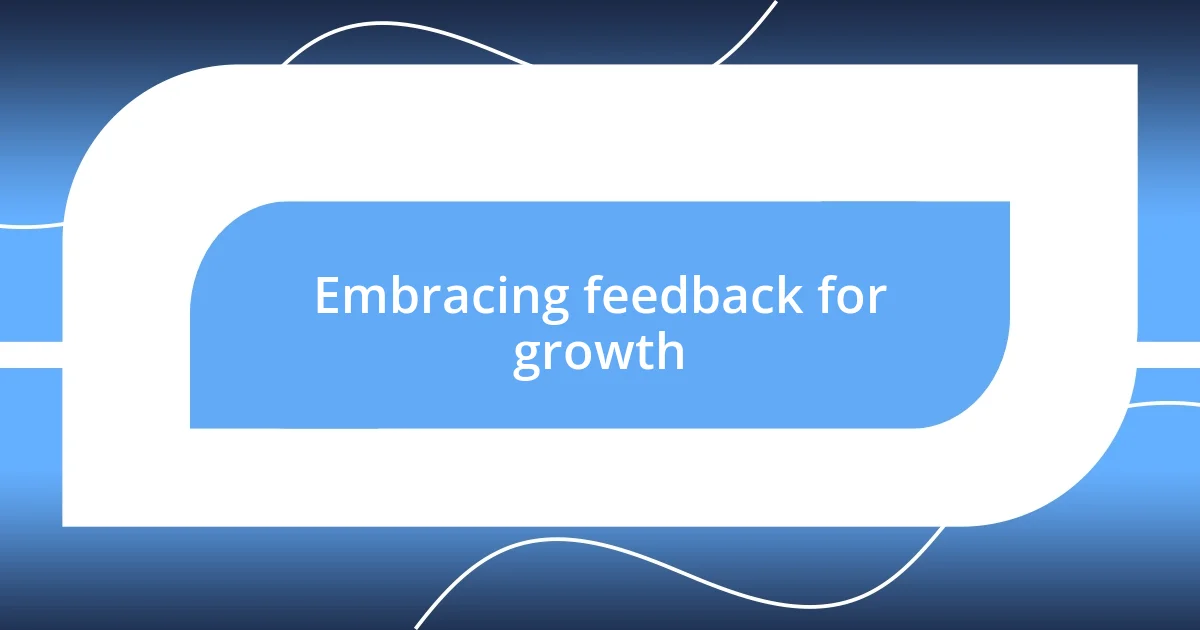
Embracing feedback for growth
Feedback has been a vital part of my writing journey, sometimes unexpected but always valuable. I remember sharing a short story with my close friend, who initially praised it. But then, she gently pointed out a few areas where my character development felt flat. I can still hear her saying, “You want your readers to connect, right?” Those simple words pushed me to dig deeper into character arcs, transforming my approach to writing significantly.
In another instance, I participated in an online critique group. I was nervous sending my work out there, fearing harsh judgments. Instead, the feedback was constructive, focusing on strong points and areas for improvement. One reviewer’s comment about my vivid descriptions made me realize that my voice shone most brightly in those moments, sparking my desire to cultivate that strength further. How often do we shy away from criticism, only to find it’s the catalyst for our growth? Embracing feedback rather than avoiding it has taught me resilience and self-awareness in my writing.
Looking back, I can see my writing has evolved through this process of accepting constructive criticism. Overall, each piece of feedback has been like a breadcrumb leading me toward a clearer understanding of my voice. I now actively seek out feedback, understanding that it ignites a dialogue about my writing. It’s not just about correcting mistakes; it’s about uncovering layers I didn’t even know existed. Would I have discovered my unique voice without those pivotal moments? I have to believe the answer is no.












